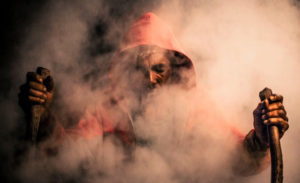Can ketamine and MDMA help Ukrainian soldiers cope with the horrors of war? Given the urgent nationwide mental-health crisis, the Ukrainian government is warming to the radical idea. And some army units are already experimenting. The nation could soon find itself on the front line of a global drug therapy revolution.
So far, Dr Vladislav Matrenitsky, a pioneer of psychedelic-assisted psychotherapy based in Kyiv, has treated around 300 patients suffering from depression, PTSD, or anxiety with ketamine therapy. A growing number of them have been soldiers, including a military psychologist, Ihor Kholodilo, who was left unable to speak after his jeep was hit by a Russian tank shell. After six sessions of ketamine therapy, his stammer was cured. Since then, he claims to have referred an elite Ukrainian special-forces unit for the treatment.
Though using ketamine to treat mental illness has been legal in Ukraine since 2017, MDMA and psilocybin — the active molecule in magic mushrooms — are still banned. But Kseniya Vozsnityna, director of Forest Glade, a government military-rehabilitation centre, believes that a pilot project using MDMA and psilocybin could be approved within six months. If so, Ukraine would be in good company. Australian clinicians became the first to treat patients with MDMA and psilocybin at the start of this year, while MDMA-assisted therapy could become a treatment for PTSD in the US this year, with the Food and Drug Administration in the final stages of approval.
As a researcher in the field, and having run legal psilocybin retreats, I’ve seen first-hand how careful use of psychedelics can help people with life-long depression or crippling PTSD. And when I spoke to psychiatrist and psychedelic researcher Simon Ruffell, he said that his ongoing study giving combat veterans Ayahuasca in Shipibo ceremonies in Peru is showing promising results: of the 28 participants with PTSD, none met the study’s criteria for PTSD after treatment.
Yet psychedelic therapy is a complicated process. An experience with psilocybin or MDMA might last eight hours, often with two therapists present for a single participant. During the trip, participants might come face to face with memories, feelings or thoughts from which they had disconnected and work through them; or they might have a powerful “mystical-type experience”. After the trip, they are encouraged to make sense of the profound insights and realisations they’ve had and integrate them into their life in a meaningful way.
In a war zone, however, drug therapy raises complex ethical questions. For instance, should ketamine or MDMA be used to improve performance in battle? Kholodilo argues that not only would psychedelics stop depression spreading through the trenches, but it could also help frontline soldiers overcome their paralysing fear of death. The appeal of this isn’t hard to glean. As Oleh Orlov, chair of the Ukrainian Psychedelic Research Association, told me: “We are in the middle of a huge war, so we kind of need people recovered. We don’t have the luxury to just go home and recover.”
It wouldn’t be the first time that psychedelics have been considered for use in warfare. In the paranoid climate of the Cold War, the CIA grew obsessed with the idea that LSD could help with espionage and psychological warfare. Between 1953 and 1973, it carried out operation MK-Ultra, a secret and illicit human experimentation programme aimed at discovering new methods of mind control and interrogation. The full scope of this shameful operation was laid bare in 1974, when it emerged that the CIA had drugged unwitting citizens with LSD to see if it could be used to force confessions. The truth is, psychedelics are far too complex and unpredictable for these purposes, but that discovery came at the cost of broken minds and shattered lives.
That said, there is no evidence that Ukraine is planning to use psychedelics or ketamine for any other purpose than mental-health treatment. And Orlov hasn’t heard of anyone in the government or the clinical community promoting psychedelics for use in battle. His NGO is focused entirely on the spiralling veteran mental-health crisis — although he does view the introduction of psychedelic therapy for veterans as a matter of national security. Ruffell, meanwhile, is sceptical that drug therapy could be used to fortify Ukrainian warriors, telling me that most of the veterans he’s treated come out of their Ayahuasca experience looking for more peace in their lives, not a return to the front line.
But such treatments are still a long way off for most Ukrainians. And in desperation, many are starting to self-medicate. Dr Jack Allocca, a neuroscientist and pharmacologist at the University of Melbourne, went to Ukraine last summer to interview soldiers, clinicians, and Ukrainian civilians about medical and recreational drug use. He described a hedonistic and chaotic scene in Kyiv and Odessa, with Ukrainians “using partying as group therapy” and taking a wide variety of drugs. The black market has been flooded with the usual recreational drugs you’d find in most cities, as well as obscure psychedelic research chemicals. These include drugs in the DOx family, which are chemically related to MDMA but highly potent and more psychedelic, with a trip lasting for 48 hours. Allocca was surprised to see such drugs on the streets, and described it as a live experiment by drug cartels on a traumatised population.
The result of all this self-medication, Allocca says, is “very messy”. One person he interviewed was overcome with guilt and grief during his trip because he feared he was going to be drafted. Another who had managed to dodge the draft got stuck in a guilt-ridden thought-loop. This is hardly a healing experience. And it’s worth emphasising that, in order to be effective, psychedelics and ketamine have to be combined with a therapeutic practice. The psychedelic experience is highly contextual, and indigenous cultures that have used them constructively have always done so in combination with meaningful rituals that give the trip a wider purpose. It is important that we do this as well.
There is, however, a good chance that Ukraine will become a hub for psychedelic research in the coming years. According to Orlov, Ukraine’s drug enforcement agency isn’t averse to rescheduling psilocybin and MDMA in a medical context, though the Minister of Health has requested more clinical data. A local pharmaceutical company has offered to make MDMA for $10 per treatment, far less than it costs in the US or UK, so that small Ukrainian trials may begin.
But in the fog of war, no one can be sure what the future will hold. After all, in a nation torn by violence, psychedelic therapy can both offer profound healing and, when used unchecked, lead to disorder. Humphry Osmond, who coined the phrase “psychedelic”, may have put it best when he wrote to Aldous Huxley in the Fifties: “To Fathom Hell or Soar Angelic, just take a pinch of psychedelic.”
Disclaimer
Some of the posts we share are controversial and we do not necessarily agree with them in the whole extend. Sometimes we agree with the content or part of it but we do not agree with the narration or language. Nevertheless we find them somehow interesting, valuable and/or informative or we share them, because we strongly believe in freedom of speech, free press and journalism. We strongly encourage you to have a critical approach to all the content, do your own research and analysis to build your own opinion.
We would be glad to have your feedback.
Source: UnHerd Read the original article here: https://unherd.com/




